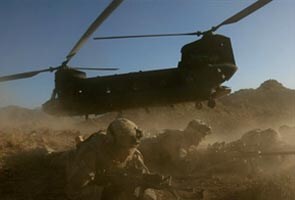
Washington:
The United States is considering leaving no American troops behind in Afghanistan after the planned 2014 withdrawal date, US officials said on Monday, amid ongoing tensions between the President Barack Obama's administration and Afghan President Hamid Karzai's government.
Obama is committed to wrapping up US military involvement in Afghanistan by the end of 2014, but the United States has been talking with officials in Afghanistan about keeping a small residual force there of perhaps 8,000 troops after next year.
US officials did not deny a report in the New York Times that Obama has become increasingly frustrated by his dealings with Karzai, with their fraying relationship falling to new depths after last month's US move to open peace talks with the Taliban.
A June 27 video conference between Obama and Karzai aimed at lowering tensions ended poorly, the Times reported on its website, citing US and Afghan officials with knowledge of the conversation.
The Times reported that Karzai accused the United States of trying to forge a separate peace with the Taliban and its Pakistani supporters in an arrangement that would expose Karzai's government to its enemies.
Since the video conference, a full military pullout from Afghanistan like the one from Iraq has been transformed from a "worst-case scenario" to an option "under serious consideration in Washington and Kabul," the Times reported.
US officials, asked about the report, pointed reporters to a comment by Ben Rhodes, the deputy White House national security adviser, who said in January that the "zero option" of leaving no troops behind is "an option that we would consider." The comment still stands, officials said.
Asked about the Times report, one senior Obama administration official said: "All options remain on the table but a decision is far from made."
The officials quoted by the Times said no decisions have been made on the pace and scale of the withdrawal.
The United States also had considered keeping a small force in Iraq after the broad troop withdrawal from that country, but talks with Iraqi leaders failed to yield such a deal.
"There's always been a zero option, but it was not seen as the main option," the Times quoted a senior Western official in Kabul as saying. "It is now becoming one of them, and if you listen to some people in Washington, it is maybe now being seen as a realistic path."
More than a dozen American troops were killed in Afghanistan last month.
The number of US troops in Afghanistan - now around 63,000 - already is set to decline to 34,000 by next February, the Times noted. The White House has said the great majority of American forces would be out of Afghanistan by the end of 2014.
US troops have been in Afghanistan since 2001. The United States invaded Afghanistan to topple the country's Taliban rulers who had harbored the al Qaeda network responsible for the September 11 attacks on the United States weeks earlier.
Obama is committed to wrapping up US military involvement in Afghanistan by the end of 2014, but the United States has been talking with officials in Afghanistan about keeping a small residual force there of perhaps 8,000 troops after next year.
US officials did not deny a report in the New York Times that Obama has become increasingly frustrated by his dealings with Karzai, with their fraying relationship falling to new depths after last month's US move to open peace talks with the Taliban.
A June 27 video conference between Obama and Karzai aimed at lowering tensions ended poorly, the Times reported on its website, citing US and Afghan officials with knowledge of the conversation.
The Times reported that Karzai accused the United States of trying to forge a separate peace with the Taliban and its Pakistani supporters in an arrangement that would expose Karzai's government to its enemies.
Since the video conference, a full military pullout from Afghanistan like the one from Iraq has been transformed from a "worst-case scenario" to an option "under serious consideration in Washington and Kabul," the Times reported.
US officials, asked about the report, pointed reporters to a comment by Ben Rhodes, the deputy White House national security adviser, who said in January that the "zero option" of leaving no troops behind is "an option that we would consider." The comment still stands, officials said.
Asked about the Times report, one senior Obama administration official said: "All options remain on the table but a decision is far from made."
The officials quoted by the Times said no decisions have been made on the pace and scale of the withdrawal.
The United States also had considered keeping a small force in Iraq after the broad troop withdrawal from that country, but talks with Iraqi leaders failed to yield such a deal.
"There's always been a zero option, but it was not seen as the main option," the Times quoted a senior Western official in Kabul as saying. "It is now becoming one of them, and if you listen to some people in Washington, it is maybe now being seen as a realistic path."
More than a dozen American troops were killed in Afghanistan last month.
The number of US troops in Afghanistan - now around 63,000 - already is set to decline to 34,000 by next February, the Times noted. The White House has said the great majority of American forces would be out of Afghanistan by the end of 2014.
US troops have been in Afghanistan since 2001. The United States invaded Afghanistan to topple the country's Taliban rulers who had harbored the al Qaeda network responsible for the September 11 attacks on the United States weeks earlier.
© Thomson Reuters 2013
Track Latest News Live on NDTV.com and get news updates from India and around the world

